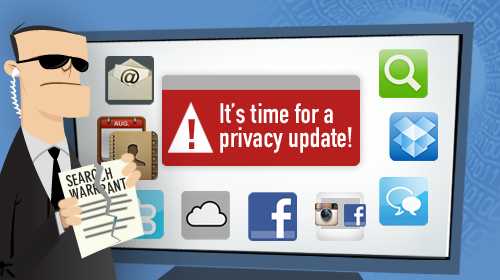
This might come as a shock to you, but the privacy of many of your electronic communications has a six-month expiration date.
The angry email you wish you didn’t send last spring where you said those unflattering things. That text message you sent a long time ago at 3:00 a.m. that you were horrified to remember the next day. Those links to those videos you shared a year ago on what you thought was your private Facebook account. Sorry to break it to you, but they’re all available to the government after 180 days.
That’s because the law governing access to our online communications was written in 1986—before the age of Facebook, Twitter, and cloud computing. The Electronic Communications Privacy Act (ECPA) permits government and law enforcement officials to access private online information—emails, social media accounts, photos, and even online documents—without a warrant from a judge, once it reaches that ripe old age of six months. Under that outdated law, government agents can force the service providers we’re entirely dependent on for communicating—Verizon, Apple, Facebook—to turn over their customers’ private data based on the government’s authority alone.
You might be thinking, “That makes absolutely no sense.” Or saying to yourself: “That certainly seems to violate the Fourth Amendment.” Unfortunately, federal laws don’t change just because technology does. Instead we’ve all got to push to make that happen.
The good news is that this should be an easy, sensible change, even right now when it seems like Congress has a hard time passing any legislation. If the government wants to read your postal mail or search your home, it needs a warrant. If it wants to listen to your phone calls, that also requires a warrant. We believe the same rule should apply to email, social media accounts, documents, and all other effects we store online. We are all increasingly living our lives online— learning, sharing, connecting, and shopping. Americans expect that their private online activities will remain private from the government, and they need laws that will protect that privacy.
Join us in calling on the White House to extend privacy rights into the digital age. Digital 4th, which includes the ACLU, has launched a petition calling for an update to ECPA. Sign the petition here, and let President Obama know that your online privacy is a right without a shelf life.
Importantly, the petition calls for a clean, strong bill to modernize ECPA. Several bills pending in Congress would strengthen our online privacy by requiring a warrant to access online communications, but regulatory agencies like the Securities and Exchange Commission are blocking reform in order to gain new powers of warrantless access. The White House should reject any effort to water down what everyone knows is a commonsense reform.
Every day it seems there is another headline about the government overreaching into our private lives—and it isn’t just the National Security Agency. It’s time for President Obama and Congress to take steps to correct domestic surveillance abuses by requiring all government agencies—whether federal, state, or local—to get a warrant based on probable cause before compelling companies to turn over their customers’ data.
Anything less is invasive and un-American.
Learn more about ECPA and other civil liberties issues: Sign up for breaking news alerts, follow us on Twitter, and like us on Facebook.


